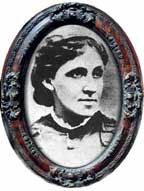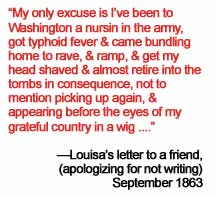 Louisa
May Alcott, the second of four sisters, was born
in Germantown, PA in 1832. Her mother, Abigail, was an early
supporter of women's rights, the abolition of slavery, and
other progressive social causes. Her father, Amos Bronson,
was a well-known educator and social reformer who advocated,
among other ideas, the radical notion that children should
enjoy their education. Louisa
May Alcott, the second of four sisters, was born
in Germantown, PA in 1832. Her mother, Abigail, was an early
supporter of women's rights, the abolition of slavery, and
other progressive social causes. Her father, Amos Bronson,
was a well-known educator and social reformer who advocated,
among other ideas, the radical notion that children should
enjoy their education.
Bronson
Alcott became famous for his philosophies, but was unable
to parlay his fame into any sort of financial stability for
his family. People weren't sure if he was a bona fide genius,
or just another flake. His easy-going methods were controversial,
and his color-blind admission policies shocked most would-be
patrons. Many parents ended up withdrawing their children
from his schools. The Alcott family moved many times, mostly
in the Boston and Concord area, and were often dependent on
the generosity of friends. Concord was home to Alcott's fellow
Transcendentalists, including Emerson, Thoreau and Hawthorne.
The Transcendentalists briefly attempted a Utopian commune
called Fruitlands,
but it was unsuccessful.
This
continual worrying about money haunted young Louisa, who vowed
to help her family any way she could. When she grew old enough
she took any job that came her way: teaching, sewing, taking
in laundry. When the Civil War broke out she became a Union
 Army
nurse and moved down to Washington, D.C. Her experiences became
the basis for one of her earlier books, Hospital Sketches.
She also contracted typhoid, and suffered through a toxic
dosing of calomel, which was the only "cure" at
the time. She suffered from this mercury poisoning the rest
of her life. Army
nurse and moved down to Washington, D.C. Her experiences became
the basis for one of her earlier books, Hospital Sketches.
She also contracted typhoid, and suffered through a toxic
dosing of calomel, which was the only "cure" at
the time. She suffered from this mercury poisoning the rest
of her life.
She wrote
several short stories and poetry for various magazines and
newspapers, as well as a series of rather scandalous "blood
and guts" thrillers under the pen name A. M.
Barnard. One day her publisher, knowing her financial
straits, famously suggested she try a "girls' book".
Children's
books at the time were pretty terrible. Most parents, if their
children were even allowed to read novels, insisted
such time be spent learning important social and moral lessons.
The results were wretchedly dull, chock full of pious, cardboard
children who bore no semblance to reality. Louisa wasn't keen
on the idea—she called such books "moral pap"—but
she needed the money. Drawing on her own close, loving family
and her own childhood experiences, Louisa wrote her "girls'
book" in less than three months. She called it Little
Women.
It was
an instant success. At first glance, it looked just like any
other "conduct novel", filled with pious instructions
for growing young ladies. But Louisa's "little women"
had the audacity to be real. Rather than
sit and work angelically on their sewing like all well-behaved
young ladies, the March girls played and laughed and bickered
and made horribly embarrassing mistakes. Willful, stubborn,
hot-tempered and ambitious, problem child Jo March (who bore
a striking resemblance to Alcott herself) flatly refused to
behave in a "ladylike" fashion throughout the entire
book. Jo openly thumbed her nose at society's constraints.
When reprimanded, she snorted her contempt. A nation of little
women—at the time saddled with few legal rights, little
chance of higher education and little future outside of endless
household chores—adored her for it.
The book
became a hit, much to Louisa's surprise. The Alcott family
money problems were solved. Louisa followed up with three
sequels (Good Wives, the first sequel, became the
second half of the Little Women we know today), as
well as some adult books. She was active in the women's sufferage
movement and other social causes. But the mercury poisoning
left her in constant pain. She published Jo's Boys
in 1886. She died two years later in Boston, at the age of
56.
In today's
publishing industry, books are lucky if they last a year.
Little Women has never been out of print since its initial
edition in 1868. It still sells thousands of copies each year.
It remains a perpetual favorite for women—big and little—all
around the world.
Selected
Links:
|





